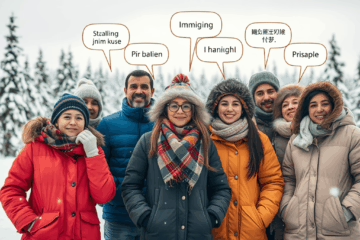Table of contents
The process of obtaining a Canadian temporary resident visa involves various steps, one of which is a comprehensive security check. This critical element ensures that individuals entering Canada temporarily do not pose a security risk to the country. Understanding the nuances of the Canadian temporary resident visa security check can be essential for applicants aiming to navigate the system successfully. This article delves into the intricacies of Canadian temporary resident visas, emphasizing the importance of security checks, detailing the components of background checks, and exploring common challenges faced during the security screening process.
Overview of Canadian Temporary Resident Visas
Canadian temporary resident visas are designed for individuals who wish to visit Canada for a limited period. These visas include visitor visas, study permits, and work permits, each tailored to meet the specific needs of the applicant. The temporary resident visa allows individuals to engage in various activities, such as tourism, business, and education, while ensuring they adhere to Canadian laws during their stay. The application process for these visas involves multiple steps, including completing forms, providing documentation, and, notably, undergoing a security check.
The issuance of a temporary resident visa is subject to meeting certain criteria set by Immigration, Refugees and Citizenship Canada (IRCC). Applicants must demonstrate their intent to leave Canada upon visa expiration, possess adequate financial resources, and have no criminal record. The Canadian temporary resident visa security check plays a pivotal role in this process, as it helps assess the applicant’s eligibility and ensures they do not pose any risks to Canadian society. Understanding these requirements is crucial for applicants to increase their chances of obtaining a visa successfully.
Importance of Security Checks in Visa Processing
Security checks are an integral component of the visa processing system, ensuring that individuals entering Canada do not threaten national security. These checks are designed to identify any potential risks associated with the applicant, such as criminal activities or affiliations with extremist groups. By conducting thorough security screenings, Canadian authorities can protect the safety and security of Canadian residents and maintain the integrity of the immigration system through a Canadian temporary resident visa security check.
The emphasis on security checks reflects Canada’s commitment to safeguarding its borders while facilitating legitimate travel. The process helps prevent illegal activities, such as human trafficking and terrorism, by identifying individuals who may be involved in such activities. As global security challenges evolve, the importance of these checks has become increasingly pronounced, making them a vital aspect of the visa application process for temporary residents.
Key Components of the Visa Background Check
The background check for a Canadian temporary resident visa encompasses several key components, each designed to provide a comprehensive assessment of the applicant’s history. These components include criminal record checks, security screenings, and immigration history evaluations. The criminal record check aims to identify any past convictions or ongoing legal proceedings that may disqualify an applicant from entering Canada. This check is conducted in collaboration with international law enforcement agencies to ensure accuracy and thoroughness. One crucial part of this process is the Canadian temporary resident visa security check.
Security screenings involve assessing the applicant’s potential ties to extremist groups or involvement in activities that could pose a threat to national security. This includes evaluating any history of espionage, terrorism, or subversion. Additionally, immigration history evaluations review the applicant’s past interactions with Canadian immigration authorities, highlighting any instances of non-compliance or violations. Together, these components form a robust background check process that ensures only eligible individuals are granted temporary resident visas.
Common Challenges in Security Screening Process
Despite its importance, the security screening process can present several challenges for applicants. One common issue is the potential for delays, as thorough checks require time and coordination with various international agencies. These delays can be particularly frustrating for applicants with urgent travel needs, such as students awaiting study permits or individuals with job offers in Canada. Understanding the timeline and potential setbacks can help applicants manage expectations and prepare accordingly.
Another challenge is the possibility of false positives, where individuals with no security risks are flagged due to errors or inaccuracies in the screening process. This can occur due to similar names, outdated information, or clerical mistakes. Such instances can lead to prolonged processing times and additional scrutiny, causing stress and uncertainty for applicants. Addressing these challenges requires a transparent and efficient system that minimizes errors while maintaining the integrity of the security screening process.
Navigating the security checks associated with Canadian temporary resident visas is a crucial step for any applicant. It involves a detailed assessment of an individual’s background to ensure they pose no threat to Canada’s security. While the process is designed to protect the nation, it can present challenges such as delays and potential errors. By understanding the importance and components of these security checks, applicants can better prepare for the visa application process, ultimately enhancing their chances of a successful outcome through a comprehensive Canadian temporary resident visa security check.
Frequently Asked Questions
What is a Canadian temporary resident visa?
A Canadian temporary resident visa allows individuals to enter Canada for a limited period for purposes such as tourism, business, or education.
What types of temporary resident visas are available in Canada?
The main types are visitor visas, study permits, and work permits.
What is the purpose of security checks in the visa process?
Security checks ensure that individuals entering Canada do not pose a risk to national security.
What are the main steps involved in applying for a Canadian temporary resident visa?
The steps include completing application forms, providing documentation, and undergoing a security check.
What is included in the background check for a Canadian visa?
The background check includes criminal record checks, security screenings, and immigration history evaluations.
Why are security checks important in visa processing?
They help prevent illegal activities and ensure the safety and security of Canadian residents.
What are the common challenges faced during security checks?
Challenges include delays and potential false positives in the screening process.
How can applicants prepare for the security check process?
Applicants should ensure all documentation is accurate and complete and be prepared for potential delays.
What happens if there is a false positive in the security screening?
The application may be delayed as additional scrutiny is applied to resolve the issue.
How long does the security screening process typically take?
The duration varies depending on the complexity of the case and coordination with international agencies.
Can a criminal record disqualify someone from obtaining a Canadian visa?
Yes, a criminal record may disqualify an applicant, depending on the nature of the offense.
What information is reviewed during immigration history evaluations?
Immigration history evaluations review past interactions with Canadian immigration authorities, including compliance with visa conditions.
How do international agencies contribute to Canadian visa security checks?
Canadian authorities collaborate with international law enforcement agencies to ensure thorough and accurate checks.
What should applicants do if their visa application is delayed?
Applicants should remain patient, monitor their application status, and provide any additional requested information promptly.
What is a visitor visa?
A visitor visa allows individuals to enter Canada temporarily for tourism or business purposes.
What is a study permit?
A study permit allows individuals to study at designated learning institutions in Canada.
What is a work permit?
A work permit allows individuals to work in Canada temporarily under specific conditions.
How does Canada ensure the accuracy of security screenings?
Canada uses advanced systems and collaborates with international agencies to verify information and minimize errors.
What are the consequences of providing false information in a visa application?
Providing false information can result in application denial and possible bans from entering Canada.
Can previous visa refusals impact future applications?
Yes, previous refusals may be reviewed as part of the immigration history evaluation.
Are security checks different for different types of temporary resident visas?
No, all temporary resident visa applications undergo a similar security screening process.
Can family members be included in a single visa application?
Yes, family members can often be included, but each applicant undergoes individual security checks.
What is the role of IRCC in the visa application process?
IRCC oversees the application process, including assessments of eligibility and security checks.
How does Canada handle visa applications from high-risk countries?
Applications from high-risk countries may undergo enhanced security screenings.
What documents are required for a Canadian temporary resident visa?
Required documents may include a passport, proof of financial support, and a letter of invitation (if applicable).
What is a biometrics requirement?
Biometrics involve providing fingerprints and a photo as part of the application process.
Why might a visa application be refused?
Applications can be refused due to incomplete documentation, security concerns, or failure to meet eligibility criteria.
Can applicants appeal a visa refusal?
In some cases, applicants can appeal or reapply with additional information addressing the refusal reasons.
Is there an expedited process for temporary resident visas?
Expedited processes are available in certain cases, such as emergencies, but are subject to strict criteria.
How can applicants track their visa application status?
Applicants can track their application status online using the IRCC portal.
What is the role of a visa consultant in the application process?
A visa consultant can provide guidance, ensure proper documentation, and assist with complex cases.
Can security screenings be waived under any circumstances?
No, security screenings are mandatory for all applicants.
What is the cost of applying for a Canadian temporary resident visa?
The cost varies depending on the type of visa. For example, a visitor visa costs CAD $100.
Are there any exemptions for security checks?
No, all applicants are required to undergo security checks.
What is the importance of providing accurate information in the application?
Accurate information ensures a smooth process and reduces the risk of delays or refusals.
Can applicants request assistance with their visa application?
Yes, applicants can seek help from immigration consultants or legal advisors.
What is the role of embassies in visa processing?
Embassies handle the initial processing and interviews for visa applications submitted abroad.
How does Canada handle privacy during security checks?
Canada adheres to strict privacy regulations to protect applicants’ personal information during the screening process.
Can an applicant reapply if their visa is denied?
Yes, applicants can reapply, addressing the reasons for the previous refusal.
What is a letter of invitation?
A letter of invitation is a document from a Canadian resident inviting the applicant to visit Canada.
Do minors need a security check for Canadian visas?
Yes, security checks are conducted for all applicants, including minors.
How are applicants notified about the outcome of their application?
Applicants are notified through the IRCC portal or by email.
What is the processing time for a temporary resident visa?
Processing times vary depending on the country of application and the type of visa.
Are security checks mandatory for all Canadian visas?
Yes, security checks are mandatory for all temporary and permanent resident visas.
What should applicants do if they encounter delays?
Applicants should contact IRCC for updates and provide any requested additional information promptly.
What is the Global Case Management System (GCMS)?
GCMS is the system used by IRCC to manage visa applications and security screenings.
Discover more from Pax Law Corporation
Subscribe to get the latest posts sent to your email.



0 Comments